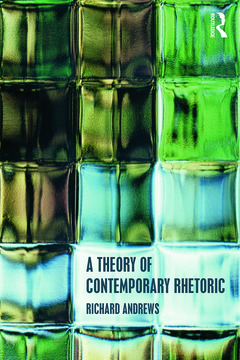A Theory of Contemporary Rhetoric
Auteur : Andrews Richard

A Theory of Contemporary Rhetoric describes, explains, and argues the overarching theory of contemporary rhetoric. This current view of rhetoric brings together themes in the communication arts, including political literary criticism; bi- and multi-lingualism; multimodality; framing as an artistic and sociological device for composition and interpretation; literacy in the digital age; and the division between fiction and ?non-fiction? in language/literature studies. Chapters explore the implications of rhetoric for particular aspects of the field. Discussions throughout the book provide illustrations that ground the material in practice.
As an overarching theory in the communication arts, rhetoric is elegant as a theoretical solution and simple as a practical one. It asks such questions as who is speaking/writing/composing? to whom? why? what is being conveyed? and how is it being conveyed?
Acknowledging the dirth of recent works addressing the theory of rhetoric, this book aims to fill the existing theoretical gap and at the same time move the field of language/literature studies forward into new territory. It provides the keynote theoretical guide for a generation of teachers, teacher educators and researchers in the fields of English as a subject; English as a second, foreign or additional language; and language study in general.
Chapter 1: Introduction
Chapter 2: Why rhetoric?
Chapter 3: Rhetoric and English studies
Chapter 4: Rhetoric and power
Chapter 5: Rhetoric and the politics of communication
Chapter 6: Rhetoric and argumentation
Chapter 7: Rhetoric and framing
Chapter 8: Multilingual rhetoric
Chapter 9: Rhetoric and poetics/poetry, or form as a rhetorical strategy
Chapter 10: Rhetoric and drama/theatre
Chapter 11: Rhetoric and multimodality
Chapter 12: Rhetoric in the digital age
Chapter 13: Rhetoric and education
Chapter 14: The future of rhetoric
Richard Andrews is Professor in English and International Coordinator at the Institute of Education, London; and Visiting Professor in English Education at the Steinhardt School of Culture, Education and Human Development, New York University. He is chair of the Institute of Education’s working group on China. He served on the English Board of the UK government’s Department of Children, Schools and Families from 2006 to 2009, and has recently been appointed to the Board of the English Subject Centre– the body that supports the teaching of English in universities in the UK.
Date de parution : 08-2013
15.2x22.9 cm
Date de parution : 01-2024
15.2x22.9 cm
Thèmes d’A Theory of Contemporary Rhetoric :
Mots-clés :
communication studies; communication theory; Public Engagement; Berlin Street; National Public Safety Commission; Yorkshire Sculpture Park; Drawing Back; White Space; London International Programmes; Smart Phone; Contemporary Rhetoric; Verbal Mode; Literature Review; Education System; Toulminian Terms; Confines Rhetoric; Comparative Education Research Centre; UK Approach; Higher Mental Functions; African American Rhetoric; Dramatic Discourse; East Asian Learner; Studio Theatre; Textual Practices; Bakhtinian Dialogic Theory; Time Real Relations; Modal Verbs



